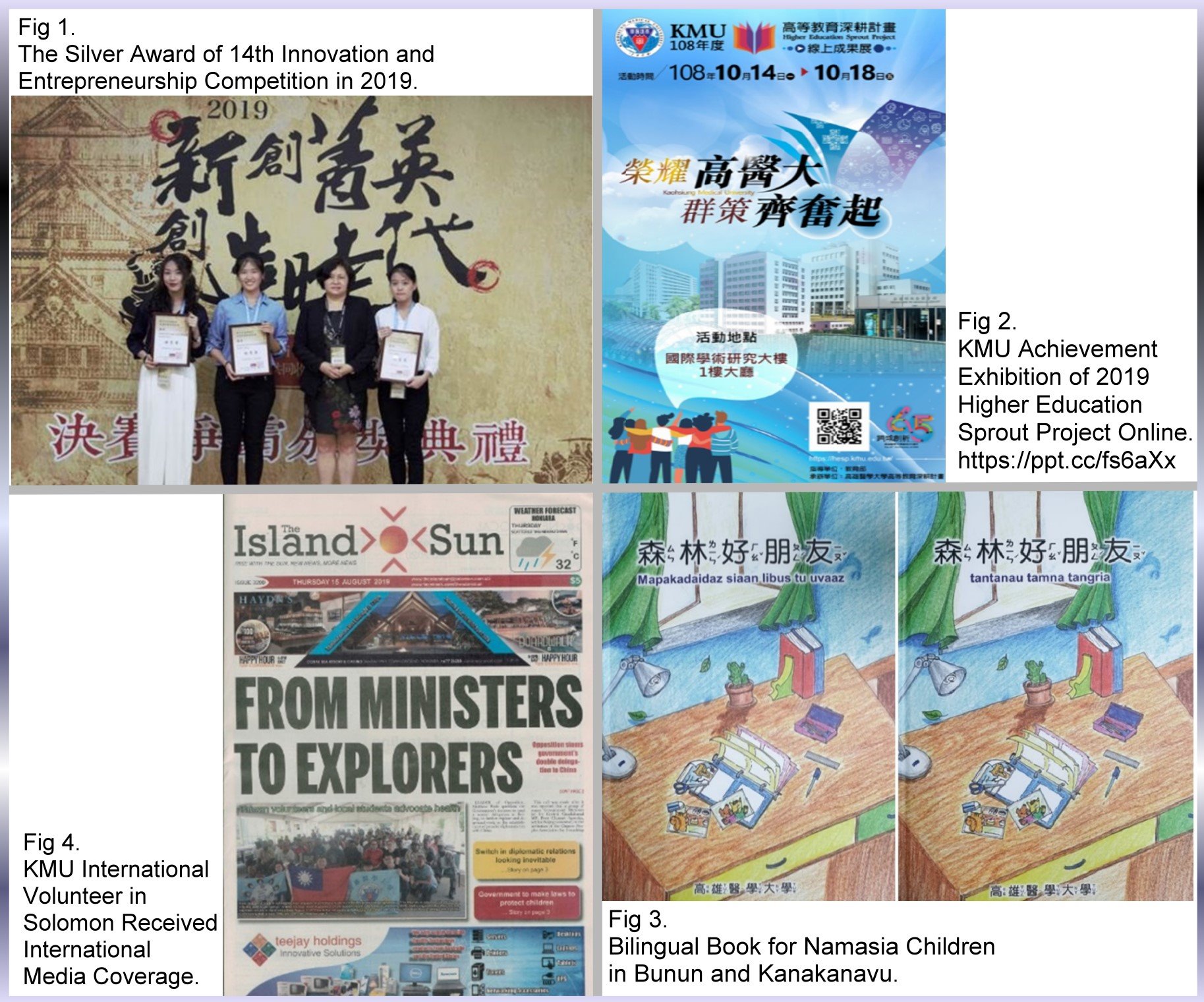Since education is the foundation of a country’s progress, KMU, funded by Higher Education SPROUT Project, integrates resources of colleges and departments, and revolutionizes courses and the strategy of teaching substantially, via four projects such as “Practicing Innovation of Teaching and Enhancing Quality of Teaching,” “Developing the Characteristics of School,” “Promoting Publicity of Higher Education,” “Reinforcing University Social Responsibility,” as well as the promotion of 18 core issues. KMU nurtures students’ ability of health care toward the future, by activating the energy of teaching, putting efforts into the influence of interdisciplinary alliance, and practicing the university’s public social responsibility. Achievements are included in what follows:
A. Practicing Innovation of Teaching and Enhancing Quality of Teaching
1.Under the promotion of teaching innovation, KMU granted the most projects among private medical schools by Teaching Practice Research Program: KMU’s teachers are devoted to the academic reform of teaching on-site. From 2018 to 2019, MOE Teaching Practice Research Program approved 36 projects for KMU. In 2018, there were 16 approved, which made KMU the second among private medical schools. In 2019, there were 20 approved, which made KMU the first.
2.Medical and humanities education embedded in knowledge in art - the first example of medical school receiving “Art Education Contribution Award”: Devoted to promoting “artistic KMU,” KMU let as much as 92.5% freshmen take part in art activities, which blended knowledge in art and medical education. In 2019 KMU received the sixth “Art Education Contribution Award (University that has best achievement)” from MOE.
3.Establishing classified course of AI (Artificial Intelligence) characteristics in medical university, and receiving outstanding result in innovation of information technology: In 2018, KMU added programming language in freshman course, “Application of computer science and information management (compulsory).” In the academic year of 2019 KMU added the test of computational thinking (information management skills) that had computer programming, and also encouraged students to enroll in courses such as “Introduction to Artificial Intelligence Engineering,” “Automation and Artificial Intelligence Mechanical Robot Apply in Biomedical Field,” “Network and Web Programming.” KMU enhanced the medical and health professions, and prepared students for the future development of smart medical services. Recently, there were student teams that received “International ICT Innovative Services Awards 2018” and “Taiwan International Robotic Tournament 2019.”
B. Developing the Characteristics of School
1.With the increasing of research energy year by year, eight subject areas have entered the global ESI top academic indicators ranking: With the integration of the research resources from the seven colleges and the clinical energy from four affiliated medical institutions, the number of subject areas at KMU entered the global top ESI academic index ranking grew from six to eight from 2017 to 2018. The field of pharmacology and toxicology even ranked among the top three in the country.
2.The R&D team has repeatedly won awards in the National Innovation and Entrepreneurship Competition, creating a new opportunity for the sustainable development of the education cycle: A total of five teams in 2018 and 2019 won the 15th-16th National Innovation Award, the 2nd place in the 13th Sengoku Strategy Technology Entrepreneurship Group in the Biotechnology and Medicine category in 2018, silver award for the 14th Sengoku Strategy Innovation and Innovation Group in 2019, and the Entrepreneurship Excellence Award for the FITI project of the Ministry of Science and Technology in 2019.
C. Promoting Publicity of Higher Education
1.With the rate of caring for financially or culturally disadvantaged students increased, KMU students’ dropout rate has decreased gradually: The "University Individual Application-Fire Enrollment Admissions" admission channel was added to provide comprehensive opportunities for students with financial or cultural disadvantage and special circumstances in 2016. In addition, a special fund for sustainability was set up, emphasizing the replacement of work-study with learning to help students feel at ease at school. The reach rate of economically or culturally disadvantaged students receiving assistance increased from 80% in 2017 to 96.7% in 2019, and the dropout rate decreased from 4% in 2017 to 3% in 2019.
2.Base school affair decision-making on research to improve school affairs management: The annual "Accountability Report" as feedback for all divisions for the basis of policy adjustment and rolling revision for the Higher Education SPROUT Project was completed. The analysis data was also included in KMU institutional research website.
D. Reinforcing University Social Responsibility
1.Raise health awareness in aboriginal community: The KMU Indigenous Social Service Team, after many years of health education service in Namasia District, collaborated with the KMU’s South Apricot Club and Art Club and compiled a bilingual children’s book entitled “My Good Friends of the Forest,” which covers the topics of sports protection, oral cleaning, environmental protection, and grandparenting, with the aim to raise local children’s health awareness as well as their environmental awareness. In 2019 the Kanakanavu and Bunun languages were added in the new version, to help the indigenous children learn their own languages through reading.
2.Install more social service stations to help more people: The KMU set up social service stations in Cijin District, Liouguei District, and Namasia District, and incorporated school curriculum with field study to address local issues. In 2018 the KMU was awarded the prize “The Best University Social Responsibility Practice” by the Ministry of Education. In 2020 the KMU also helped Namasia District develop the placemaking project “Indigenous Bees at Wilderness.”
These achievements not only exemplify the KMU’s efforts in the promotion of teaching quality, research and innovation, and university social responsibility practice, but also have laid a solid foundation for the school’s future development in the field of health-care education and social practice.
